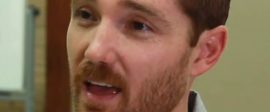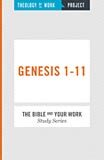Stewardship of Creation: An Interview with “Noah” Screenwriter, Ari Handel
The first thing you need to know about Ari Handel, co-writer of the 2014 film adaptation of the Noah story, is that he holds a PhD in neurobiology from New York University. Handel and director/co-writer Darren Aronofsky had been suitemates as Harvard University undergrads and began collaborating on films after Handel decided a career in science wasn’t right for him.
His educational background hasn’t gone to waste, however. It informs his work and can be seen subtly weaving its way through this film. Unlike other articles about Handel’s and Aronofsky’s adaptation, this one focuses on its scientific and stewardship of creation themes. The interview has been edited for length and clarity.
The High Calling: In your interpretation of the Noah story, it seems that the sins for which humanity is judged have a lot to do with their treatment of the earth and animals over which “the Creator” has given them responsibility. Is that intentional?
Ari Handel: Yes. We thought a lot about: what was the sin? Because it doesn’t really say very clearly. What does it say? It says the heart of mankind was filled with wickedness. That’s pretty vague. And then it says mankind corrupted the earth and filled it with violence.
We show human violence in the film. But, corrupting the earth. What does it mean to corrupt the earth? We felt corrupting the earth was a stewardship question. We looked at the other rules and there weren’t many rules before Noah. You have the Noahide Laws and the Ten Commandments, but those come later.
When Cain killed Abel, he was punished by God. That was a rule. Murder. So that’s in the film as a sin. Eating the “apple” was clearly forbidden. And then vegetarianism was proscribed as the way to live until after the Flood.
When we made Noah a vegetarian and other people meat eaters, that was in keeping with the Bible. The first thing that happens after the soul is breathed into Adam in Genesis 2, is that God places him in the Garden to tend it and to keep it. That’s a fundamental, first responsibility.
On the other hand, there’s a whole conversation about taking dominion over the earth. That dynamic of a responsibility towards the earth and the creatures within it is something we wanted to explore in the film. It’s completely purposeful, but it’s also completely grounded in Genesis.
One way to think about this is, in Genesis, mankind is given dominion and then mankind is asked to have stewardship. I think that is pretty much reflective of where we are today. It’s undeniable that we have dominion over this world. It is under our rule in the sense that we are affecting it more than anything has ever affected it. A lot of the things on this planet are going to live or die at our mercy. We have dominion. It’s been given to us. Whether you think that’s right or wrong, good or bad, it’s true. The question is: will we take stewardship?
The American Association for the Advancement of Science and the Intergovernmental Panel on Climate Change both recently issued reports saying there is no real debate among scientists about climate change, and yet doubts persist. Watching the film, one can’t help but think of Noah warning people of impending doom in the biblical account. Were you thinking at all about climate change as you were writing?
That’s very particular. The idea that environmentalism became a politicized word and that somehow if you’re a religious person, to care about the animals and the world is anti-religious in some fashion, I don’t know how that happened. It seems very odd, because if you’re religious you believe that God made all this stuff and therefore it’s holy and beautiful and should be cared for, and you believe that one of the great sins of mankind is to be hubristic and to not know your own place. So it’s strange to me that it’s gone that way.
One of the things we thought about was that we do have a responsibility for creation, and this story is clearly about a man who’s here to conserve the animals. There are certainly environmental themes in the story that are relevant to today. There are parallels. If we can have any influence that makes people say, “You know, it’s not contradictory to care about stewardship and to be religious,” that would be great.
In the sequence where Noah is recounting the creation story to his wife and children, there is a stunning visual depiction of evolution. Were you intentionally saying religion, or the Genesis story, does not have to be at odds with evolution?
Absolutely. We put them together, but we didn’t put them together to say, “Look, you can put these things together.” That scene was meant to emotionally convey glory and awe at the majesty, beauty, and complexity of creation. It was the scene in which Noah was justifying harsh actions out of love and awe for creation.
For us, showing how the universe was created and the earth was formed, and how life evolved while listening to Russell Crowe speak poetry from Genesis is incredibly majestic. We took the most powerful elements we could find to try and give people that sense of the beauty of the world around them. I don’t think religion and evolution contradict at all. I think they can go together.
In that vein, while there’s a lot of diversity shown in the animal kingdom, there’s no racial diversity in the cast. Can you speak to that?
From the beginning, we were concerned about casting, the issue of race. What we realized is that this story is functioning at the level of myth, and as a mythical story, the race of the individuals doesn’t matter. They’re supposed to be stand-ins for all people. Either you end up with a Bennetton ad or the crew of the Starship Enterprise. You either try to put everything in there, which just calls attention to it, or you just say, “Let’s make that not a factor, because we’re trying to deal with everyman.” Looking at this story through that kind of lens is the same as saying, “Would the ark float and is it big enough to get all the species in there?” That’s irrelevant to the questions because the questions are operating on a different plane than that; they’re operating on the mythical plane.
Patton Dodd in his On Faith review of the film said, “To condemn Noah for being wrong about the story of Noah (whether in theological or historical terms) is to ensure that people won’t read and re-read the story of Noah, or at least that they won’t read it anew, won’t encounter the story on its own terms." He then talked about how the film was a catalyst for in-depth discussion of the biblical account for him and a friend. The overarching theme in your interpretation seems to be about mercy vs. judgment. Is that right?
If you’re going to boil down the essence of what we were trying to do, that was one of the twin poles, to really break expectations of the story so people could look at it fresh, and then encounter these big questions that the story of Noah in Genesis poses. They don’t have to agree with where we get to or even how we get there, but if people are grappling with it, that’s great. The other pole was to make Noah and his family real people, who are existing as real characters grounded within this universe so that we can relate to them.
At The High Calling we talk a lot about the high calling of our daily work. You walked away from a career in neuroscience after investing a lot of time in preparation for that career. What would you say to people considering a radical change like that?
I used to think it was the bravest thing I ever did because I loved neuroscience and I still do, but part of me knew it wasn’t what I wanted to be doing and I wasn’t happy there. I didn’t know what I needed to do, but I knew I had to jump. I had to just say no to neuroscience before I figured out what I needed to do next.
And you’re still using your science in your work.
Looking back, the first movie I made was about a neuroscientist and it’s all useful. It all becomes who you are. It’s never wasted.
Image courtesy of Paramount Pictures.
Stewardship of Creation
The mission of Leave No Trace is to teach “people how to enjoy the outdoors responsibly.” It’s an ethics program based on protection and preservation. Biblical stewardship of the environment respects this high standard, then takes it a step further—adding propagation to the mix. We’re hardwired to create, so when God told us to work the earth and take care of it, he gave us permission to make beauty out of the basic; to turn raw ingredients into art, science, entertainment, and nourishment. How we do this matters greatly, and it starts with responsibility.
Our Stewardship of Creation series at The High Calling explores how daily decisions can leave the world better than we found it. We hope you’ll join us for the conversation.






